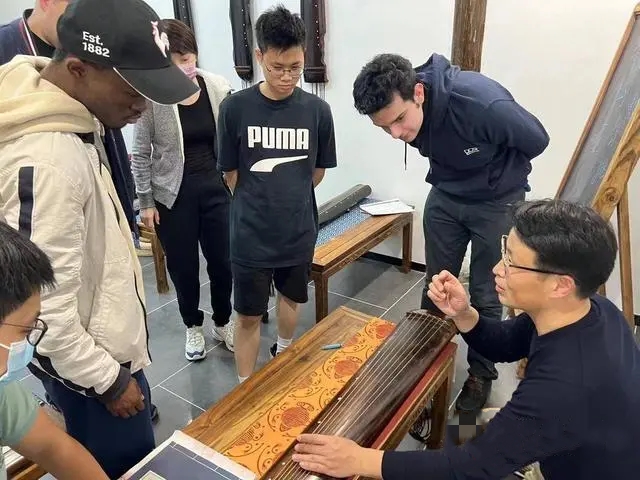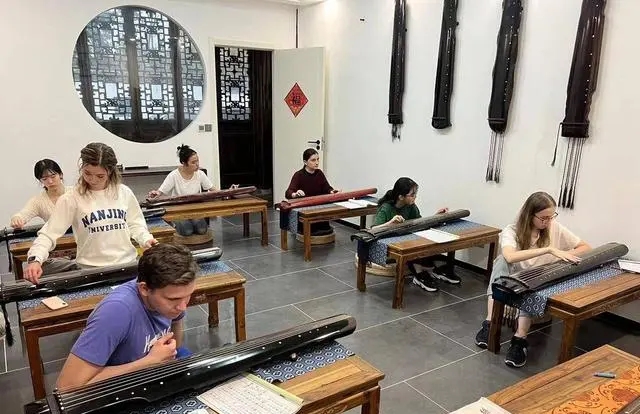Ntu International Students Experience Chinese traditional Culture activity: 13 international students experience the unique charm of silk string Guqin
On November 12, the Chinese traditional Culture Experience activity for NTU International students was held in the "South Wind Chang" Sixian Guqin Cultural Center in the west of Lao Men. Yu Xiaobo, Secretary General of Jiangsu Center attended the activity. Thirteen international students from all over the world experienced the unique charm of the traditional silk guqin.

At the beginning of the event, Huang Ziling, a non-hereditary inheritors of "Sixian Guqin" and director of Jiangsu International Cultural Exchange Center, gave a lecture on "Philosophy, aesthetics and Literature in Guqin". The contents covered: the origin of Guqin, the aesthetics of Guqin, Guqin and literati and literary works, and the thoughts on the rites and music of Guqin.
Huang Ziling analyzed the logic and rationality of Shennong's making qin by taking the golden inscription of "medicine" as an example, "Qin, like tea, was originally medicine." He introduced that "Shu Tung is solid, Chu silk has a clear sound", and silk Tong has a clear sound and a thin sound, which is in line with the thoughts of Daoism and Plato's simple music, and is the common aesthetic point of excellent music.
In terms of culture and history, Huang Ziling introduced some famous qin people, including the qin passed on by Yao and Shun, Confucius' Book of Songs, Boya's high mountains and flowing water, Shi Kuang's snow, Zhuge Liang's empty city plan, Ji Kang Guangling's SAN, the poems of Wang Wei, Li Bai, Bai Juyi, Fan Zhongyan, Ouyang Xiu, Su Shi...
"Music, so repair within; Ritual, so repair outside also." Huang Ziling explained that rites and music are the core concept of traditional Chinese culture, and the qin is the core carrier of rites and music. Therefore, the United Nations Educational, Scientific and Cultural Organization listed the guqin as the earliest intangible cultural heritage of humanity. "Foreign students can learn about traditional Chinese culture through Guqin. In addition, by learning Guqin, one can cultivate one's body and mind. Through understanding, one can better understand the way of neutralization and understand the philosophical idea of 'harmonizing the world with the sum of heaven and earth' in Guqin."

Combined with humanistic stories, he demonstrated some music and showed the guqin strings made by himself. Then the students went to the piano room to experience playing the guqin, feel the reduction of the character spectrum, string sequence emblem position, hook, scattered according to the overtone and other "clever" guqin. A Chinese girl of Chinese origin, who is proficient in Chinese, said that she could hear the Chinese beauty of politeness, elegance and implicit fortitude in the traditional silk guqin. She showed a strong interest in and love for this ancient and elegant Chinese "ritual instrument", and kept asking the teacher about its "mystery".
A guy from Germany speaks Chinese with a special standard and proper accent. He said that he once came to China to participate in an activity, think China is very interesting, like a treasure, there are endless interesting elements to learn, so he chose to study in Chinese universities.
At the end of the event, teachers from the Guqin Hall took the students to experience Chinese tea. Everyone sat together, happily tasting tea, eating tea, with relish to listen to the teacher told the Chinese story of Shennong found tea by tasting hundreds of herbs.
Involving musical instruments
Guess you like
Hot news
- 01 The Simple Difference Between Guqin, Se, and Guzheng
- 02 The difference between the five-stringed lute and the four-stringed lute
- 03 The difference between cymbals and cymbals in ethnic musical instruments
- 04 Dulcimer exam and performance repertoire
- 05 The handsome guy in 1997 is so advanced in pulling erhu! Netizen: Come and "wash your ears"
 渝公网安备 50010702504639号
渝公网安备 50010702504639号